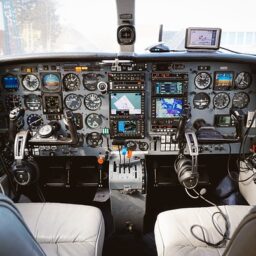
Avionics Technology Degrees
Texas State Technical College describes avionics technology degrees as preparing students to repair and maintain "a plane’s electronic instruments, such as radios, radars, and navigation aids. As we see more use of digital technology, more time is spent maintaining a plane’s computer systems. Not to mention, avionics technicians are increasingly working within the aerospace industry."A degree in Avionics Technology can be a strategic step for service members transitioning into civilian careers. For those with military experience in aircraft maintenance or electronics, it builds on your existing skills, giving you the certifications and education needed to thrive in aviation.
With a focus on complex aviation electronic systems, this degree helps service members translate their hands-on military experience into well-paying, high-demand civilian roles. It's a pathway to secure career opportunities and long-term growth in any aviation sector.
Is an Avionics Technology Degree hard?
A degree in Avionics Technology requires students to engage in coursework that combines electronics and aircraft systems. It demands a strong understanding of both theory and hands-on practical skills.The difficulty level varies, depending on your aptitude for technical subjects and former experience. If you've worked on vehicles during your military career, your skills will provide you with a solid foundation, making earning the degree a more manageable task. Your prior experience will not only aid in your learning but also give you a head start in the coursework.
Avionics techs working in civilian aviation must be certified by the FAA, and most employers require an Airframe and Powerplant (A&P) certification. Those working on working on communications systems must pass a General Radiotelephone Operator licensing exam administered by the Federal Communications Commission (FCC). Avionics Bachelor's degree programs typically require students to take these certification and licensing tests before graduating.
Earn a Degree in Avionics Technology
An Avionics Technology program teaches students science, engineering and technology as they apply to aviation. They may achieve training hours and hands-on experience in the following topics:- Basic Electronics
- Digital Systems and Microprocessors
- Aircraft Instrumentation
- Avionics Systems
- Communication and Navigation Systems
- Radar and Surveillance Systems
- Electrical Power Systems
- Aircraft Maintenance Procedures
- Flight Control Systems
- Troubleshooting and Diagnostics
- Aviation Regulations and Standards
- Human Factors in Aviation
- Safety Management Systems
GI BIll and Yellow Ribbon Program options to Earn a Degree in Avionics Technology
Our list of GI Bill and Yellow Ribbon participating schools is below. Don't forget to explore your other military financial aid and veteran student financial aid opportunities. There is also help for military spouses who need scholarships and other types of financial aid.Associate Degree in Avionics Technology
An Associate Degree in Avionics Technology is a two-year program. Graduates gain classroom knowledge and hands-on experience with avionics equipment and are prepared for entry-level positions as avionics technicians, working on commercial, military, or private aircraft.Jobs with an Associate Degree in Avionics Technology
- Avionics Technician: Avionics technicians install, maintain, and repair electronic systems in aircraft.
- Aircraft Maintenance Technician: In this role, an individual performs routine electronic components and systems inspections and repairs on aircraft.
- Radio Communication Technician: Radio communication technicians specialize in maintaining and repairing aircraft communication systems.
Filters
Degree Level
Search and select multiple degree level.
Search and select multiple degree level.
Degree Program or Area of Study
Search and select multiple area of focus.
Search and select multiple area of focus.
Where do you plan to study?
Type of School
Years Offered
Campus Setting
Size of School
Gender-Specific
Religious Affiliation
Religious Affiliation
Ethnic Affiliation
Financial SupportAcademic SupportPrograms
Bachelor’s Degree in Avionics Technology
A Bachelor’s Degree in Avionics Technology takes about four years to complete and combines technical knowledge of electronics and computer systems with aviation-specific subjects like navigation, communication, and flight control systems. Students may also study management, safety protocols, and aviation regulations.The program prepares graduates for advanced and lucrative roles in avionics engineering, systems management, or supervisory positions in the aviation industry.
Jobs with a Bachelor’s Degree in Avionics Technology
- Avionics Engineer: Avionics engineers design, develop, and test electronic systems used in aircraft that meet safety and performance standards. Median Annual Salary: $81,940.
- Avionics Technician Supervisor: In this role, an individual oversees a team of technicians, coordinating maintenance and repairs on avionics systems. Median Annual Salary: $121,129.
- Systems Integration Engineer: A person in this role works closely with other engineering teams to make systems function seamlessly together. Median Annual Salary: $178,568.
Is an Avionics Technology Degree worth it?
Earning this degree can give you a competitive edge when applying for jobs. The demand for qualified technicians remains steady, particularly as aircraft become more technologically advanced. A degree can help you stand out in a competitive job market, increasing your chances of finding a well-paying position in the commercial or private aviation sectors. It may lead you to supervisory roles, engineering positions, or systems management.Active duty service members, veterans and their families can use educational entitlements for low to no-cost degree-seeking opportunities. Programs such as MyCAA (for eligible spouses), the GI Bill, and the Yellow Ribbon program are opportunities to pursue to maximize your learning and earning potential.
GI Bill-approved Schools and Yellow Ribbon Schools with Avionics Technology Degrees
Ready to start your Degree in Avionics Technology? Check out these programs available at our partner schools:Wichita State University-Campus of Applied Sciences and Technology -Offers an Associate of Science in Avionics Technology and is approved for tuition assistance.
San Bernardino Valley College-Offers an Associate of Science in Avionics Technology and is approved for tuition assistance.
Vaughn College of Aeronautics and Technology-Offers an Associate of Science and Bachelor’s of Science in Avionics Technology and is approved for tuition assistance and the Yellow Ribbon Program.



